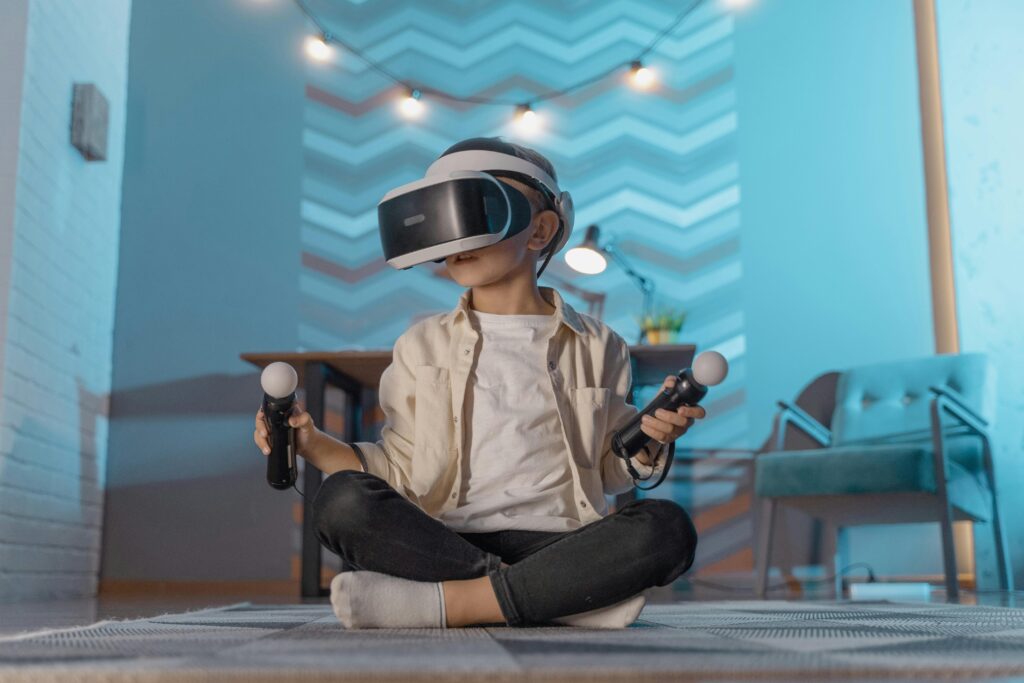Great AI In Entertainment and Lifestyle in 2024
Introduction to AI in Entertainment and Lifestyle
The integration of artificial intelligence (AI) into our entertainment and lifestyle sectors is proving to be transformative, fundamentally reshaping how content is created, consumed, and personalized.
As we move through 2024, AI technologies evolve at an unique pace, enhancing user experiences in various ways. From personalized recommendations in streaming services to advanced algorithms that assist in content creation, AI’s presence is endless.
The importance of AI in entertainment goes beyond mere automation; it involves the cultivation of an interactive relationship between users and platforms.
As AI-driven tools analyze user behavior and preferences, they provide a tailored entertainment experience that resonates more with individual tastes.
For instance, streaming platforms leverage AI to curate lists of content based on viewing patterns, enabling users to discover new films and shows that align with their interests seamlessly. This personalization not only enhances the user journey but also optimizes engagement rates across platforms.
Moreover, AI plays a crucial role in content production. Creative professionals employ AI-powered software to streamline the writing, editing, and production processes. Whether it’s generating scripts, scoring music, or developing game narratives, AI’s capabilities help us to refine and speed up the creative workflow.
This combination of human creativity and AI efficiency ensures a higher quality of output, catering to a diverse array of audience preferences. As the landscape of entertainment increases, the influence of AI tools becomes increasingly pivotal.
In lifestyle applications, AI is similarly reshaping how individuals manage their day-to-day activities. Smart assistants and personalized wellness programs harness AI technology to offer tailor-fitted solutions, from scheduling and home automation to health monitoring.
This level of personalization brings convenience and sophistication to daily life, reflecting AI’s significant role in both enriching and simplifying individual experiences in 2024.
AI in Gaming: Revolutionizing Gameplay

The gaming industry has witnessed a significant transformation in recent years, with artificial intelligence (AI) playing a crucial role in this evolution.
AI technologies are now capable of enhancing gameplay experiences, resulting in more immersive environments, innovative gameplay mechanics, and increased player engagement.
A key aspect of this transformation is the development of intelligent non-player characters (NPCs), which are designed to react and adapt to player behavior in real time.
This capability not only increases the realism of gaming scenarios but also provides players with unique interactions, making each gameplay experience distinct.
Moreover, the utilization of AI in gaming has given rise to adaptive difficulty levels. This feature analyzes player performance and adjusts game challenges accordingly, ensuring both new and experienced players enjoy a balanced and engaging experience.
Such tailored gameplay enhances user satisfaction and encourages prolonged engagement, thereby elevating the overall enjoyment of the game.
In 2024, several AI-driven titles have been released, showcasing the advancements in game design and player interaction, such as AI-assisted narratives that dynamically change based on players’ decisions and emotional responses.
The impact of AI on game design extends beyond enhanced realism and complexity. Developers are now leveraging machine learning algorithms to analyze vast datasets that reflect player preferences, allowing for more personalized game content and experiences.
This insight enables studios to create games that resonate with the audience’s interests and gaming habits. Additionally, AI-generated content is becoming more prevalent, allowing for a virtually limitless creative landscape in terms of game graphics, sounds, and even storyline development.
Overall, AI continues to revolutionize the gaming landscape, creating opportunities for innovation and engagement that redefine traditional gameplay.
AI-Powered Content Creation Tools

As the digital landscape continues to evolve, the advent of AI-powered content creation tools stands out as a significant transformation in the entertainment and lifestyle sectors.
These innovative tools are designed to assist creators in various domains such as writing, music composition, and video production, streamlining their workflow and enhancing the quality of output.
The year 2024 has seen significant advancements in these tools, making them more accessible and effective for creatives.
In the field of writing, AI tools like ChatGPT, Jasper, and Grammarly have garnered considerable attention. Jasper offers advanced AI-driven writing assistance, enabling users to generate high-quality content based on specific prompts or themes.
It is designed not only to enhance creativity but also to save time by generating drafts, brainstorming ideas, and even suggesting edits to improve clarity.
Meanwhile, Grammarly goes beyond basic grammar checking by providing style suggestions and tone adjustments based on the context of the writing. This allows writers to maintain a polished and professional voice in their work.
AI is also making significant strides in music composition with tools such as Amper Music and AIVA. Amper Music allows users to create royalty-free music tracks in various styles by simply selecting parameters like mood and instrumentation.
In contrast, AIVA leverages deep learning algorithms to compose music mindful of classical greats, providing an authentic sound for various projects.
These tools enable musicians and content creators to produce original soundtracks more efficiently and with less resource investment.
Lastly, advancements in video production are evident in tools like Magisto and Adobe Premiere Pro’s auto-edit feature. Magisto uses AI to analyze footage and create engaging videos tailored to the user’s specified goals, such as marketing or storytelling.
Adobe Premiere Pro’s recent upgrades enhance editing capabilities through automated practices, allowing creators to focus more on the artistic aspects rather than the technicalities.
By integrating these AI-powered tools into their workflow, creators are unlocking fantastic levels of creativity and productivity.
Personalized Streaming Services Enhanced by AI
In recent years, artificial intelligence (AI) has profoundly transformed the landscape of entertainment, particularly in the field of personalized streaming services.
Platforms such as Netflix and Spotify have increasingly relied on sophisticated AI algorithms to analyze user behavior, preferences, and patterns, thereby offering tailored recommendations that resonate deeply with individual tastes.
This innovative approach not only enhances user experience but also significantly boosts customer engagement and satisfaction.
AI-driven technology utilizes extensive datasets to comprehend viewing and listening habits, allowing it to predict what content users are most likely to enjoy.
For instance, Netflix employs a unique algorithm that assesses various data points, including genre preferences, viewing history, and even the time spent on each title, to curate a personalized home page for each user.
This level of customization ensures that subscribers are continually introduced to new content aligned with their interests, fostering a sense of engagement that keeps them returning for more.
On the other hand, music streaming platforms like Spotify leverage AI to create personalized playlists, such as Discover Weekly and Release Radar, which showcase songs and artists based on user listening habits.
By employing collaborative filtering and natural language processing techniques, Spotify can offer genuinely unique recommendations that enhance the musical journey for listeners.
This intelligent analysis not only connects users to tracks that evoke specific emotions but also helps them explore new genres they may not have considered otherwise.
Furthermore, AI personalization contributes to discovering niche content, allowing users to delve into lesser-known films, series, or artists they might typically overlook.
This broadened horizon not only satisfies existing customer needs but also fosters loyalty toward the streaming platform, demonstrating that personalization through AI can significantly impact consumer behavior.
AI in Social Media: Transforming Interaction

In recent years, the influence of artificial intelligence (AI) on social media has become increasingly profound, altering the ways users engage with platforms, consume content, and interact with one another.
As we move into 2024, AI continues to innovate and refine social media experiences through several key functions, including intelligent content moderation, the deployment of chatbots, and the personalization of feeds.
One significant impact of AI in social media is its role in content moderation. Algorithms are now capable of swiftly identifying inappropriate or harmful content, ensuring that online environments remain safe for users.
AI systems can analyze images, videos, and text, filtering out offensive content with greater accuracy than ever before.
This allows human moderators to focus on more rare cases and improves the overall experience for users who seek meaningful interactions without the distractions of harmful materials.
Additionally, AI-driven chatbots have transformed user engagement on social media platforms. These virtual assistants provide real-time communication with brands, enhancing customer service and making them accessible at all hours.
As chatbots become increasingly sophisticated, they can understand context and sentiment, enabling more personalized interactions that meet individual needs.
This shift improves brand loyalty and cultivates a supportive community where users can connect over shared interests.
Personalized feeds, powered by machine learning algorithms, are another part of AI’s impact. These algorithms assess user behavior, preferences, and interactions to curate tailored content that matches individual interests.
As a result, users encounter a more engaging experience, filled with relevant posts, videos, and advertisements that reflect their tastes and tendencies. This personalization ensures that social media remains not only entertaining but also informative and meaningful.
As the technological landscape continues to evolve, the role of AI in social media is expected to grow, further redefining how users interact, share, and consume content in this digital age.
The Impact of Artificial Intelligence
Health and Wellness

Artificial Intelligence (AI) has emerged as a revolutionary force in the health and wellness sector, particularly in 2024. As individuals strive to enhance their lifestyle through better health management, AI tools have proven to be essential in monitoring various aspects of wellness.
Specially, these tools facilitate tracking fitness activities, mental health, and nutritional intake, catering to a growing demand for personalized health solutions.
AI-driven wearables, such as smartwatches and fitness trackers, have become essential companions for individuals seeking to improve their physical health. These devices utilize sophisticated algorithms to monitor vital signs, track exercise patterns, and provide real-time feedback.
By analyzing data collected from users, AI technologies can offer tailored recommendations, thereby enhancing the effectiveness of individual fitness regimens.
For instance, in 2024, many fitness apps have integrated AI capabilities that facilitate personalized workout plans based on user performance and goals.
Furthermore, mental health management has significantly benefited from AI applications. Innovative platforms leverage natural language processing and machine learning to offer virtual therapy and counseling services.
These AI-driven tools not only analyze patterns in conversational data to provide appropriate coping strategies but also track emotional changes over time. This helps individuals become more aware of their mental health status and encourages proactive measures to enhance their emotional well-being.
Nutrition also plays a crucial role in holistic health, and AI has transformed how we approach meal planning and dietary choices.
Various AI applications enable users to input their eating habits and preferences, subsequently generating customized meal plans that align with health objectives.
This integration of AI in nutrition management not only simplifies food choices but also aids in the maintenance of balanced diets.
Overall, the convergence of AI and wellness in 2024 marks a vital moment in lifestyle management, enabling individuals to take control of their health journeys through personalized insights and data-driven decisions.
AI in Virtual and Augmented Reality Experiences

The integration of artificial intelligence (AI) with virtual reality (VR) and augmented reality (AR) technologies has revolutionized the entertainment landscape in 2024.
As these technologies continue to evolve, AI is playing a crucial role in enhancing user experiences, creating immersive environments, and enabling interactive storytelling that captivates audiences like never before.
This convergence allows developers to craft simulations and environments that respond dynamically to user inputs, enhancing engagement and realism.
In 2024, numerous AI-driven VR games have emerged, showcasing how this technological partnership can create engaging narratives and foster deeper connections between players and the virtual worlds they inhabit.
For instance, cutting-edge games now offer AI-generated content that adapts to individual player styles, preferences, and skill levels, making each gameplay unique. This personalized approach not only enriches the gaming experience but also encourages players to explore multiple narratives and outcomes.
Similarly, AR applications have leveraged AI capabilities to bridge the gap between the digital and physical worlds. By utilizing computer vision and machine learning algorithms, these applications can enhance real-world interactions through enriched information overlays and contextual experiences.
For example, AI is being used in AR tools to provide real-time translations of foreign signage or to overlay historical information about landmarks as users explore cities. This level of interaction transforms how individuals consume content, allowing for a more connected and informed experience.
In conclusion, the fusion of AI with VR and AR technologies is significantly shaping the future of entertainment and lifestyle.
By delivering personalized experiences, AI is not only redefining gaming but also enriching everyday life through practical applications that engage, inform, and immerse users in ways that were previously unimaginable.
The innovations seen in 2024 serve as a testament to the potential of AI to transform entertainment into a more interactive and meaningful experience for all.
Ethical Considerations and Challenges of AI In Entertainment

The integration of artificial intelligence (AI) tools into the entertainment and lifestyle sectors has raised significant ethical considerations and challenges. One of the primary concerns is data privacy.
As AI systems require vast amounts of data to function effectively, they often rely on personal information from users. This reliance can lead to situations where data is collected, stored, and utilized without proper consent, prompting debates regarding user rights and the protection of personal data.
Stakeholders are increasingly calling for regulations that safeguard individuals’ privacy, ensuring that data collection practices are transparent and consensual.
Another pressing issue involves the potential biases embedded within AI algorithms. These biases can stem from the data sets used to train these systems, often reflecting societal prejudices and inequalities.
As a result, AI-generated content, whether it be in film, music, or other forms of media, may perpetuate stereotypes or exclude marginalized voices. The challenge lies in creating algorithms that are fair and inclusive.
In 2024, industries are prioritizing the development of bias mitigation techniques, with ongoing discussions about how to ensure that AI tools promote diversity and representation in entertainment.
Moreover, the increasing reliance on AI for creativity raises questions about the essence of artistic expression. As AI-generated content becomes more prevalent, concerns about originality and authenticity in creative works come to the forefront.
Critics argue that the use of AI can dilute the human element in artistic endeavors, while proponents claim that AI serves as a complementary tool that expands creative possibilities.
The dialogue surrounding these issues continues, leading to potential policy changes and evolving standards that seek to balance innovation with ethical responsibility.
Stakeholders in the entertainment industry must navigate these complexities to foster an environment that respects both creativity and ethical considerations. In conclusion, addressing these challenges will be crucial for the sustainable integration of AI in entertainment and lifestyle sectors moving forward.
Conclusion
As we navigate through the infinite of advancements in artificial intelligence, it becomes increasingly clear that AI will play a crucial role in shaping the future of entertainment and lifestyle.
The tools explored in this blog post illustrate a significant transformation in how we interact with digital content and our daily lives. From personalized content curation to engaging virtual experiences, AI is not merely enhancing existing platforms but is fundamentally redefining them.
The rise of AI-driven applications allows for greater customization, ensuring that entertainment is uniquely tailored to individual preferences and behaviors.
Moreover, the integration of AI technologies promises an evolution in leisure activities. By enabling seamless interaction with various forms of media, AI can create immersive environments that deeply engage users.
For instance, virtual reality experiences powered by AI algorithms can adapt in real time to user interactions, providing unparalleled levels of immersion and enjoyment. As AI continues to evolve, its application will extend beyond mere entertainment, playing a crucial role in lifestyle choices and wellness.
The potential for AI to analyze personal data and suggest healthier lifestyle habits demonstrates its capability to influence not only how we entertain ourselves but also how we live our daily lives.
Looking ahead to 2024 and beyond, it is critical to reflect on these innovations and consider their broader implications.
As AI continues to integrate into our entertainment and lifestyle choices, a future characterized by enhanced interactivity and personalization is on the horizon. Readers are encouraged to ponder how these advancements may impact their own experiences and interactions, fostering a deeper connection with the digital world.
Embracing this transformation could lead to a more enriched, enjoyable, and sustainable way of living, fundamentally changing the landscape of leisure and daily activities.



